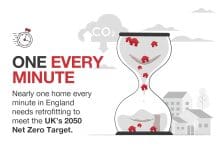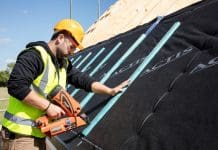The UK Green Building Council (UKGBC) has unveiled a framework for the UK construction and property industry to transition new and existing buildings to become net zero carbon by 2050
The UKGBC report follows six months of intense industry engagement, involving over 180 experts and stakeholders from across the construction and property value chain, and is supported by 13 trade associations and industry bodies including BPF, RICS and RIBA.
It provides an overarching framework of consistent principles and metrics that can be integrated into tools, policies and practices, and aims to build consensus in the construction and property industry on the approach to decarbonising buildings.
The new framework offers guidance for developers, owners and occupiers targeting zero carbon buildings, setting out key principles to follow and outlining how such a claim should be measured and evidenced.
Two approaches to net zero carbon are proposed by the framework which can be accurately measured today:
- Net zero carbon – construction: the embodied emissions associated with products and construction should be measured, reduced and offset to achieve net zero carbon.
- Net zero carbon – operational energy: The energy used by the building in operation should be reduced and where possible any demand met through renewable energy. Any remaining emissions from operational energy use should be offset to achieve net zero carbon.
With this report presented as a starting point, the next ten years will see the scope and ambition of the framework increased to encourage greater action. In the short-term, additional requirements will be introduced to challenge the industry, including minimum energy efficiency targets and limits on the use of offsets. In the longer term, the two approaches for construction and operational energy will be integrated into a broader approach for net zero whole life carbon, covering all of the emissions associated with the construction, operation, maintenance and demolition of a building.
Richard Twinn, senior policy advisor at UKGBC said: “The urgency of tackling climate change means that businesses must work together to drive down emissions as fast as possible. But this requires a shared vision for what needs to be achieved and the action that needs to be taken.
“This framework is intended as a catalyst for the construction and property industry to build consensus on the transition to net zero carbon buildings and start to work towards consistent and ambitious outcomes. It is the first step on a journey towards ensuring all of our buildings are fit for the future.”
Peter Tse, business manager, BSRIA’s sustainable construction group, said: “BSRIA is proud to be involved in the development of this essential net zero carbon buildings framework definition, along with the other built environment experts and stakeholders. The framework vitally provides clear definition of net zero carbon buildings and direction towards a zero-carbon future.
“This framework challenges the construction and property industry to reassess the way buildings are designed, constructed and run, which requires a cultural change. A verified net zero carbon building for operational energy is based on in-use energy, instead of modelled energy, demonstrating a building’s performance is at net zero carbon.
“BSRIA’s Soft Landings initiative is an established approach, supporting the industry refocus towards in-use performance.”
James Wimpenny, chief executive at BAM Construct UK said: “Contractors, clients, supply chains need to work together – and quickly – to radically change the way we procure, design and deliver buildings.
“Smart use of renewable technologies and efficient use of low carbon materials are a priority. Reducing carbon makes financial sense over the lifecycle of buildings and that means we should not focus solely on capital costs when procuring a building.”














